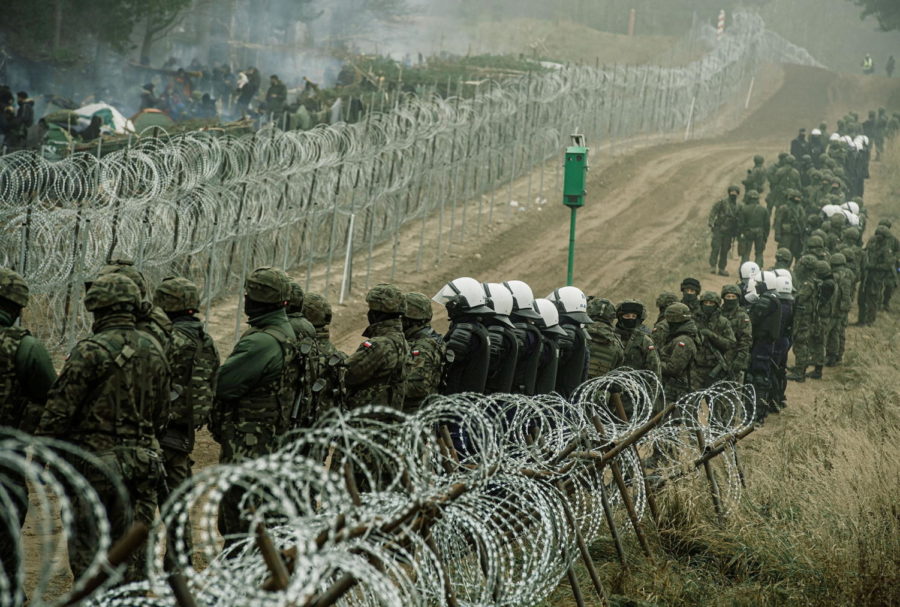The Poland-Belarusian Immigrant & Humanitarian Crisis
FILE PHOTO: Polish soldiers and police watch migrants at the Poland/Belarus border near Kuznica, Poland, in this photograph released by the Territorial Defence Forces, November 12, 2021. Irek Dorozanski/DWOT/Handout via REUTERS
Age-old combatants, Russia, and the West’s face off on a new front: the Poland-Belarusian border.
Background
In 2020, incumbent President, Alexander Lukashenko of Belarus, claimed that he won the presidential election. This triggered massive protests among the people as he and his regime have long been accused of electoral fraud. Lukashenko’s refusal to step down caused extreme sanctions to be placed upon Belarus by the European Union and other Western nations. It also caused Belarus to earn the nickname, “the last European dictatorship.”
These events were swiftly followed by the forced expatriation of the woman many believed Lukashenko lost the 2020 presidential election to, Sviatlana Tsikhanouskaya, and the forced landing of a Ryanair Flight to arrest journalist and political activist, Roman Protasevich. These events only caused more concern from the West and more sanctions to be placed on Belarus according to ForeignPolicy.com. Notably, throughout all of this, both Belarus and Lukashenko had the backing of Russia.
The Making of a Crisis
Ever since July of 2021, Belarus’s President Alexander Lukashenko has been threatening to cause an influx of “criminals” from the Middle East in Poland, as the threat of criminal immigrants is more likely to upset the Polish government. He planned to do this by flooding their borders and helping immigrants illegally cross through them. Since then, the Lukashenko government has been inviting hundreds, if not thousands of Middle Eastern immigrants from destabilized regions to Belarus by making Belarus seem extremely attractive to these refugees.
However, once these people reach Belarus, they are forced onwards and made to try to illegally cross the border to Poland and sometimes Lithuania and Latvia, oftentimes with direct help from Belarusian border troops. Additionally, they are even told that it is perfectly legal to cross into Poland and other countries, even without the proper papers and documentation. If they refuse, the migrants are oftentimes beaten and forced onwards. According to the UN, they are usually given little to no food, water, or other supplies and tend to be underdressed for the European weather as they are coming from warmer climates. Once the refugees reach the border with Poland, they are either illegally snuck through by Belarusian troops or refused entry by Polish troops and forced to try to find another way through by the Belarusian troops.
This cycle continues until the refugees either make it through to Poland and possibly farther west without being caught or are forced back to Minsk (the capital of Belarus). Each time the cycle repeats, the migrants only become more and more ragged with hunger, disease, and fear. Belarusian guards and officials have also been also refusing to let the migrants return home and have been found to have beaten them if they attempted to return home. On top of all of this, Belarus has been refusing humanitarian aid for the refugees from Poland and other members of the European Union.
Motives
This crisis had been described as hybrid warfare based on human trafficking by the governments of Lithuania, Latvia, and Poland on numerous occasions. By forcing such vulnerable peoples through the border, Belarus hopes to make it more difficult for the countries they border to force the migrants out. Additionally, out of all of this, Belarus hopes to force the European Union’s hand to lift the sanctions placed on Belarus. By supporting Belarus, Russia hopes to destabilize the West and strike back against the EU.
Either way, this proxy-war has evolved into a full-out humanitarian crisis and human lives rest on the outcome of future diplomatic endeavors to ease the tensions.


